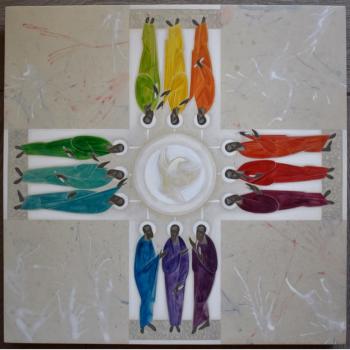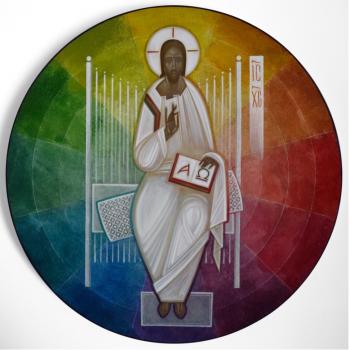
This is Part 4 in a series of posts exploring the question “Should all Christians become vegetarians?”
In Part 1, I laid the foundation for why this question is one that Christians, particularly American Christians, ought to take seriously.
In Part 2, I outlined a biblical theology of creation.
In Part 3, I surveyed what the Scriptures say about death before the fall.
In this section, we will survey the Scriptures say about eating meat before the fall, after the fall, and in the age to come.
When were humans given permission to eat meat? And why?
The first explicit permission given to feast on animal flesh is after the flood.
And God blessed Noah and his sons and said to them, “Be fruitful and multiply and fill the earth. The fear of you and the dread of you shall be upon every beast of the earth and upon every bird of the heavens, upon everything that creeps on the ground and all the fish of the sea. Into your hand they are delivered. Every moving thing that lives shall be food for you. And as I gave you the green plants, I give you everything. (Gen 9:1-3)
There are at least two options as to why this is the case. The first is that of accommodation. On this view, God gives humans meat to accommodate for the hardness of heart. This is what God does with divorce and marriage (see Matt 19:8). Jesus teaches that the divorce regulations allowed by Moses were concessions to deal with reality of sin not an expression of God’s desire or intention for how things ought to be. Divorce may be necessary to curb other worse evils but it’s never good. Maybe this is the case for eating meat: humans are going to do it anyway. They now know how delicious bacon is – let’s just let them eat it.
The second option I can think of is that meat is a more abundant blessing for humanity in this next go round. Genesis 9:1-7 is a recapitulation of Genesis 1-2. The flood was God’s reset button – he is (mostly) starting over with Noah and his family. He issues the same vocation – exercise dominion, be fruit and multiply – only this time God explicitly gives permission to eat meat. The rationale is that this is an even greater blessing to Humanity Version 1.2.
So, which option is it? Why did God give permission to eat meat after the flood? The answer: insufficient data. We are not told why, we are left to speculate.
Will there be meat eating in the age to come?
The Scriptural data on this question is mixed but I am going to go ahead and say I think so!
To refute this, the first passage most would turn to is probably Isaiah 11:6-9, where the prophet paints a picture of the eschaton when the wolf will lie with the lamb and the lion with the fattened calf.
The wolf shall dwell with the lamb, and the leopard shall lie down with the young goat, and the calf and the lion and the fattened calf together; and a little child shall lead them. The cow and the bear shall graze; their young shall lie down together; and the lion shall eat straw like the ox. The nursing child shall play over the hole of the cobra, and the weaned child shall put his hand on the adder’s den. They shall not hurt or destroy in all my holy mountain; for the earth shall be full of the knowledge of the Lord as the waters cover the sea. (Isa 11:6-9)
At first blush this seems like a clear rejection of meat eating in the age to come. But, if you keep reading Isaiah, you’ll see that he gives us mixed signals. In Isaiah 25, the prophet paints a different picture of the eschaton, that of a sumptuous feast.
On this mountain the Lord of hosts will make for all peoples a feast of rich food, a feast of well-aged wine, of rich food full of marrow, of aged wine well refined. And he will swallow up on this mountain the covering that is cast over all peoples, the veil that is spread over all nations. He will swallow up death forever; and the Lord God will wipe away tears from all faces, and the reproach of his people he will take away from all the earth, for the Lord has spoken. (Isa 25:6-9)
Isaiah 11 suggests that carnivores will simply stop eating meat. But then, in Isaiah 25, we are told the menu of the eschatological feast will include the choicest cuts of meat – “rich food full of marrow.”
What is more, meat appears on the menu of the wedding feast the King throws for his son. In Matthew 22, Jesus says, “The kingdom of heaven may be compared to a king who gave a wedding feast for his son.” Notice how he describes the menu: “Tell those who are invited, “See, I have prepared my dinner, my oxen and my fat calves have been slaughtered, and everything is ready. Come to the wedding feast” (Matt 22:4). To paraphrase the notorious Ugluk, it looks like meat just might be back on the menu!
All jokes aside, surely we ought to take this with a grain of salt (pun intended). This is a parable and the point is not to reveal the courses. Nevertheless, it isn’t nothing. Jesus, at least in the parable, has no hesitation describing the eschatological feast, the marriage supper of the lamb to which this parable points as a feast whose main course is slaughtered oxen and fattened calves.
How are we to make sense of this? I think this is a clue that we are not meant to take these visions or parables literalistically. The point is not that lions will stop being lions (imagine the implications – would their teeth and jaw structure change, would their digestive system be restructured?). The point is not to tell the guests what they can expect to eat at the wedding banquet of the King’s Son. I think the language for these visions is hyperbolic imagery meant to paint the most fantastic picture of a world made new. All the wrongs will be made right, there will be no more fear or oppression or tragedy. The age to come will be characterized by feasting, not famine.
Something fishy?
As we’ve seen, the visions of the Age to Come offer a rich spread of images into the way of things in the New Creation. But, as I’ve argued, the data is mixed. Some visions suggest that there will be no more death and hence no meat eating. Others, it would seem, cannot image a heavenly banquet without something so delicious as meat. Again, I think that this seeming paradox is not really a problem because I think it can be explained by the fact that we are not to take these visions literalistically.
With all of that said, the last data point may be the most salient for our purposes. The final thing we will consider here is Jesus’ diet post-resurrection. (Yes, you read that right).
Perhaps the clearest indication that we will eat animals in the Age to Come is the fact that Jesus did so after he was raised from the dead. We this is in post-resurrection appearances in two of the gospels. In John 21:9-14, we read that Jesus was cooking up some Tiberian fish on a charcoal fire so his disciples could eat breakfast. It’s not clear if Jesus joined in this particular feast. However, Luke makes it explicit in his gospel, that Jesus ate fish:
And while they still disbelieved for joy and were marveling, he said to them, “Have you anything here to eat?” They gave him a piece of broiled fish, and he took it and ate before them. (Luke 24:41-43)
I grant that the correspondence is not 1:1. A resurrected body in a fallen creation is not the same as a resurrected body in the New Creation. Nevertheless, I think it is significant that Jesus went ham on some freshwater fish.
Summary: where does this leave us?
There seems to be a clear biblical warrant for not eating meat. There is very little to suggest that eating meat is ipso facto unbiblical or unethical. In fact, the weight of the evidence points in the opposite direction.
We see this particularly clearly when Jesus is beginning the movement that would embody and bear witness to the Kingdom of God, he does not call them to be vegetarians. Quite the contrary, he says: “Rise, Peter; kill and eat.” (Acts 10:13) This, of course, is a command about the end of Jewish-Gentile divisions and the dissolution of Jewish dietary restrictions. Nevertheless, inferences can be made. Jesus is, after all, commandingPeter to kill animals and eat them. To this I say a hearty Amen and praise the good Lord for bacon.
Now, that said, despite the fact that I consider the eating of meat to be one of God’s great blessings to human beings, my family and I eat very little of it. It’s fair to say we are functional vegetarians. My preferred way of self-identifying is “pescatarianish” because I will occasionally eat meat when it is ethically sourced, but eat mostly fish. However, because high quality, ethically sourced meat, or wild caught fish is so expensive, we don’t eat much of it.
With all of this said (including Parts 1 – 3), it is now possible to begin to offer an answer to the question, “should all Christians be vegetarian?”
Unless they can afford ethically sourced meat/fish, I think Christians should make radical moves towards vegetarianism. The reason for this is this simple: this is how vice-regency looks like when lived out in context. The meat industry is by and large a blight against the human vocation to bring creation to full bloom.
Most of our meat is sourced from factory farms which have an incredibly negative impact on humans (both workers and consumers), the animals involved, and the environment. Insofar as they are able, Christians should do what they can to avoid participating in systems of injustice/structural sin, which is why Christians should trend towards vegetarianism.
In the Part 5, we will consider these stewardship issues in more detail. Stay tuned!











